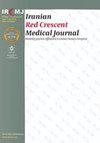Investigation of Barriers and Facilitators of Covid-19 Vaccine Injection from the Perspective of People in Yazd in 2022
IF 0.2
4区 医学
Q3 MEDICINE, GENERAL & INTERNAL
引用次数: 0
Abstract
Background: Vaccination and observing hygienic measures were rendered necessary due to the spread of the Covid-19. Yet, in spite of the effective and immunizing role of vaccines in the past, hesitancy about undergoing vaccination against Covid-19 has become a global issue. Objectives: The present study aimed to investigate the barriers and facilitators of Covid-19 vaccine injections from the perspective of people in Yazd in 2022. Methods: The present study was a population-based cross-sectional study conducted on 572 people over 12 years of age in Yazd, Iran, using cluster sampling (46 head clusters of health centers). To collect data, a researcher-made questionnaire was applied, which measured barriers and facilitators of Covid-19 vaccine injection. The mean score of the questionnaire was above 70, indicating more attitude, trust, and willingness. Results: Based on the findings, 406 (70.7%) participants were female, 457 (79.6%) were married, and 232 (40.4%) were housewives. The mean age of the subjects was 39.1±14.7 years. In total, 277 (48.4%) participants had a positive attitude toward Covid-19 vaccination, 224 (39.2%) had trust in the vaccine, and 21(3.8%) showed willingness to injection, indicating an overall low attitude, trust, and willingness toward the injection of Covid-19 vaccine. There was a significant relationship between willingness to inject the vaccine and education (P=0.048). A strong correlation was also found between attitude and trust in vaccination, with a coefficient of 0.811 (P<0.001). Conclusion: A positive attitude and trust in Covid-19 vaccination were observed at an average level, and willingness to be vaccinated was at a low level. Considering the role of the three variables of education, gender, and the type of a person’s occupation, planning should be done to improve people’s attitude, trust, and willingness to inject the vaccine by focusing on the above variables.2022年亚兹德地区民众视角下新冠肺炎疫苗注射障碍与促进因素调查
背景:由于新冠肺炎的传播,接种疫苗和遵守卫生措施变得必要。然而,尽管过去疫苗具有有效和免疫作用,但对接种新冠肺炎疫苗的犹豫已成为一个全球性问题。目的:本研究旨在从2022年亚兹德人的角度调查新冠肺炎疫苗注射的障碍和促进因素。方法:本研究是一项基于人群的横断面研究,采用整群抽样(46个卫生中心的头群),对伊朗亚兹德572名12岁以上的人进行了研究。为了收集数据,采用了研究人员制作的问卷,测量了新冠肺炎疫苗注射的障碍和促进因素。问卷的平均得分在70分以上,表明更多的态度、信任和意愿。结果:根据调查结果,406名(70.7%)参与者为女性,457名(79.6%)为已婚,232名(40.4%)为家庭主妇。受试者的平均年龄为39.1±14.7岁。总共有277名(48.4%)参与者对新冠肺炎疫苗接种持积极态度,224名(39.2%)参与者对疫苗持信任态度,21名(3.8%)参与者表示愿意注射,这表明他们对注射新冠肺炎疫苗的态度、信任和意愿总体较低。接种意愿与受教育程度呈显著相关(P=0.048),接种态度与信任度呈显著相关,相关系数为0.811(P<0.001)。考虑到教育、性别和职业类型这三个变量的作用,应该通过关注上述变量来提高人们的态度、信任和注射疫苗的意愿。
本文章由计算机程序翻译,如有差异,请以英文原文为准。
求助全文
约1分钟内获得全文
求助全文
来源期刊

Iranian Red Crescent Medical Journal
MEDICINE, GENERAL & INTERNAL-
CiteScore
1.16
自引率
0.00%
发文量
0
期刊介绍:
The IRANIAN RED CRESCENT MEDICAL JOURNAL is an international, English language, peer-reviewed journal dealing with general Medicine and Surgery, Disaster Medicine and Health Policy. It is an official Journal of the Iranian Hospital Dubai and is published monthly. The Iranian Red Crescent Medical Journal aims at publishing the high quality materials, both clinical and scientific, on all aspects of Medicine and Surgery
 求助内容:
求助内容: 应助结果提醒方式:
应助结果提醒方式:


